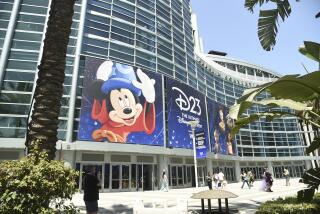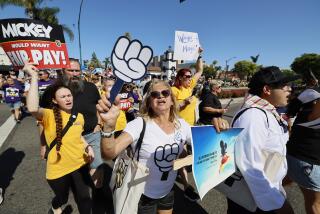COMMENTARY ON DISNEYLAND : Blame Process, Not the Project, for Park’s Political Blunder : If the company gets another chance in Washington, it must cover its bases and follow Anaheim’s lead.
Someday Disney’s prince will come-- but for now he won’t be riding on the back of the U.S. taxpayer.
Such was the verdict of the House Public Works and Transportation Committee when it voted out its five-year-transportation bill just before the August recess. Disney’s request for a multimillion-dollar “federal demonstration project” to help facilitate its proposed Anaheim expansion project was completely turned down. Unfortunately, the committee also rejected the city of Anaheim’s funding request, which was far more respectful of the taxpayers’ dollars.
From Washington to Orange County, the ensuing avalanche of Disney-bashing was not a pretty sight for those of us who appreciate what Disneyland has meant to Orange County.
For 35 years Orange County has had a love affair with Disneyland. Think Orange County and you think Disney. It has given us worldwide renown, brought in thousands of jobs and millions of dollars in tax revenue. There is indeed something magical about this “Happiest Place on Earth” that makes nearly all Orange County residents grateful that Walt Disney settled in among us back in 1955.
In large part it is because the folks at Disneyland have worked very hard at being good neighbors, not just good business people. The fun of the park aside, whether through Disneyland’s annual sponsorship of its widely acclaimed Community Service Awards in support of Orange County nonprofit organizations or its yearly Christmas show for sick and handicapped residents, Disneyland continues to sponsor or participate in countless other charitable, cultural and community projects very important to our county.
So how did Disney go wrong? Certainly it is not with its proposed expansion project.
Once completed, the new Disneyland Resort will support about 28,000 full-time, permanent jobs in Southern California, 63% of which will be in Anaheim alone. Anaheim will receive $38 million in net annual revenue from property, hotel, sales and miscellaneous taxes. Orange County will collect $9 million in annual tax revenue. Even the Orange County Transportation Authority will receive $4 million in annual sales tax revenue.
In short, at full build-out, the Disneyland Resort project is expected to generate new direct and indirect economic activity of about $1.2 billion per year in Anaheim and $2.3 billion per year in the five-county region of Southern California.
These are staggering benefits. And it is welcome news about needed investment in a county and state heavily dependent upon tourism, yet increasingly beset with job flight, business retention failures, reduced tax revenue and sagging consumer spending.
It wasn’t the project but the process that defeated Disney in Washington. By aggressively advancing, but not coordinating its own proposal with Anaheim, Disney led influential congressmen into concluding that its request for taxpayer monies would yield more of a benefit to Disney than to the public. Those congressmen were right; but only with respect to a small part of Disney’s overall request. Nevertheless, the committee threw the baby out with the bathwater and Anaheim lost out on securing a relatively small public investment in a large private project that will actually yield great public benefit.
Rep. Christopher Cox (R-Newport Beach), a member of the influential House Public Works Committee, called the Disney proposal “quintessential pork.” Rep. Cox is correct about that project. And he rightly holds the same view about the other nearly 440 “demonstration projects” in this transportation bill. (It is no coincidence that there are 435 congressmen and approximately 435 demonstration projects--give a project, get a vote.)
If there were a conservative coalition majority in the Congress, transportation bills like this one would not likely see the light of day. As a practical matter, conservatives know the country cannot afford them. But also, there is an important federalist principle at stake here. The federal government should not fund purely intra- state transportation projects now that the federal inter- state highway system is complete. Instead, send the taxing and spending authority back to the states.
Yet, until a congressional conservative coalition majority re-emerges, conservative Republicans are left with little choice but to support these kinds of bills if their enactment is certain , and provided there are no other overriding controversial issues. It would be a Pyrrhic victory indeed to spread around Orange County’s federal taxes everywhere else but here, thus denying Orange County its fair share of the federal pig. And that’s exactly what the committee authors would do.
When the House reconvenes next week, however, enactment of the transportation bill will be in serious doubt precisely because of a major overriding issue--taxes. The committee bill also contains another outrageous (5-cent) increase in the federal gasoline tax. It is expected and hoped that a sufficient number of nervous House Democrats will now vote with anti-tax Republicans to kill the bill outright.
If killed for now, eventually congressional Democrats will resurrect another transportation bill. Maybe it will include demonstration projects, maybe not. But for Disney some valuable lessons have already been learned. If it receives another chance at bat, Disney must identify the issues and clearly state its case, cover all the political bases and follow closely the lead of the more seasoned Anaheim city officials. Then all Disney’s dreams for Orange County may come true.
More to Read
Sign up for Essential California
The most important California stories and recommendations in your inbox every morning.
You may occasionally receive promotional content from the Los Angeles Times.










